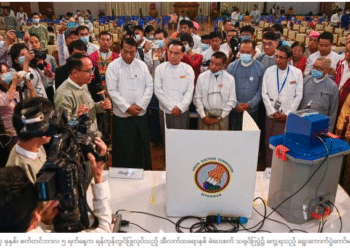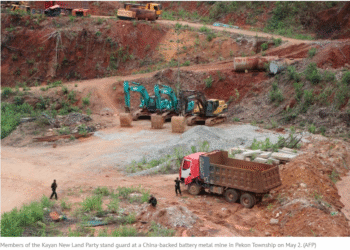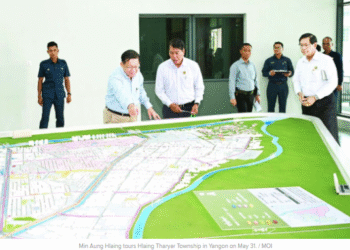APRIL 10, 2021
With most internet access cut, one Frontier reporter struggles to keep their Ayeyarwady Region village informed while dictating stories to editors in Yangon by phone.
By FRONTIER
For someone from the city, the village I grew up in might seem tiny, even though it’s a typical settlement of about 2,000 households on the lower reaches of the Ayeyarwady River. Despite its relative proximity to Yangon, it still feels isolated; getting there requires a 90-minute boat ride from Danubyu, the nearest major town. For most of our lives we relied on word of mouth and a handful of phone lines – and, later, expensive CDMA mobile phones – to communicate with the outside world.
The arrival of mobile internet in 2013 started a process of massive social and economic change. At first it was like a trickle – only young people who had been to university knew how to connect. But when Ooredoo’s 3G network arrived, it quickly became a flood. From 2015, everyone in the village got online; even elderly people owned a smartphone.
It wasn’t long before Facebook became the main source of news. Once-voracious newspaper readers soon stopped flicking pages and began scrolling on screens. Before long, the aunty who had delivered newspapers for years was selling bus tickets instead. When I returned late last year, I recall seeing people using Facebook even while working in the paddy fields.
Not everyone uses Facebook to read the news, of course. But after the February 1 coup, the thirst for information about what was happening was immense. You can therefore imagine the shock when the military regime cut mobile internet on March 17.
In some nearby villages, the flow of information from the outside world dried up almost entirely. My village was lucky – 10 or so homes had fixed wireless internet.
Mine was among them, and I noticed people began addressing me differently. I started to miss those annoying old greetings – tamin sar pyi byi lar? (have you eaten?) and ma twei dar gyar byi, war lar deh naw (long time no see, you look a little fat); now, all anyone said was, “Have you heard any news from the internet today? Please share it with me.”
But when the military cut my fixed wireless connection on April 2, I got a taste of life in the information vacuum. There’s no fibre internet for miles around here, so every day since then I have called my friends in Yangon who still have internet and asked them the exact same question that so irritated me just a few weeks ago.
The blackout hasn’t just affected my access to information, it’s also made it hard to work. When I first returned to my village, in the third week of March, I was able to email completed articles to my editors, but the wireless shutdown has made this impossible.
Sending articles by SMS didn’t seem like a good idea, because as Frontier readers will know, our stories are often quite long. Instead, I’ve been reading out my articles over the phone to an editor, who then types them on his computer.
Although there have been a few miscommunications, it has turned out to be the easiest and fastest way – this one took just 15 or 20 minutes. I suppose I should look on the bright side – it’s a new experience for me, even if it’s something that older journalists probably once had to do regularly. It’s certainly made me appreciate the convenience of the internet.
But the information vacuum has a dark side; rumours and misinformation spread more easily, and are often hard to debunk. A few days after the internet blackout, my aunt shared some information she’d heard in the market: war would soon break out in Yangon because ethnic armed groups were approaching the country’s largest city en masse. She was worried that she wouldn’t be able to return to Yangon after the mid-April Thingyan festival, but I told her to relax and explained why the rumour was clearly untrue.
Other rumours are harder to dismiss. One day, we heard that soldiers were coming to arrest civil servants who had joined the Civil Disobedience Movement in our village and others nearby. I couldn’t dismiss this one out of hand; I’d covered the CDM for Frontier, and knew it was hurting the military regime badly.
When the soldiers arrived, there was chaos. Striking workers fled their homes and hid for the entire day. It turned out the soldiers had only come to arrest gamblers. No one knows who spread the rumour.
It’s not like we lack any information at all – we still have television. But most independent broadcasters have been banned, and young people have been encouraging elder relatives to boycott MRTV and Myawady. They’re afraid that, out of habit or boredom, their elders will watch the two military-controlled channels and start to believe the junta’s newscasts.
Some homes also have dishes for PSI satellite. This Thailand-based service broadcasts the independent Democratic Voice of Burma and Mizzima, which have become important sources of news in the village.
Yesterday, my uncle, who lives in Yangon’s outer Hmawbi Township, called my father to say the local administrator had ordered residents to hand in their PSI dishes. We also heard that that the Thai company announced it was temporarily suspending both DVB and Mizzima.
For now, at least, DVB and Mizzima are available on different channel numbers, and our administrator hasn’t said anything to us. The closest military battalion is far from our village, so people aren’t afraid to keep their dishes up.
But there’s still a thirst for the internet, for Facebook, and for news.
Lately, a lot of villagers have started believing a rumour that Japan will soon provide Myanmar people with satellite internet to bypass the military’s restrictions.
I’m tired of explaining to people every day that this is impossible. Although it’s sad to see the hope fade from their eyes, I think it’s important that we face reality.
We haven’t given up. People in villages like mine have only been using the internet for five or six years, but it has brought about a huge change in their lifestyle and mindset, and they can’t accept having the internet suddenly taken away from them.
They are not willing to go back to the dark old days.
Source – Frontier Myanmar ( https://www.frontiermyanmar.net/en/any-news-from-the-internet-fear-and-rumour-in-villages-forced-offline/ )






